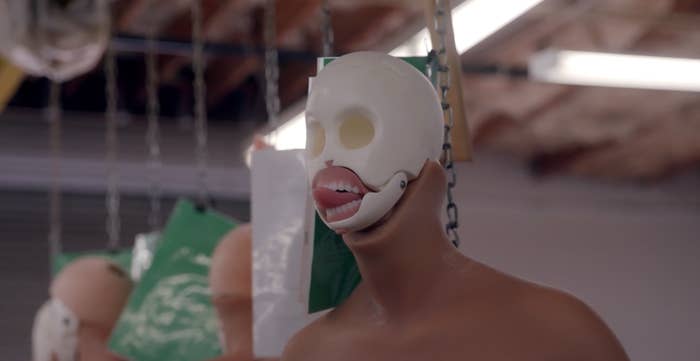
When news of the "first oral sex robot" made the rounds last week, the headlines and tweets came alongside photos of sexy silicone faces with lips parted and eyes painted into come-hither stares. But when you click through to photos of the actual “Autoblow” robot, what you see looks more like a Wi-Fi router with benefits.
So it tends to go with sex robots, where the moral panic and/or misogynist jubilation about the looming replacement of women has long run far ahead of reality.
The idea of sex machines as technological comeuppance for women who dared declare their liberation has grown alongside the boom in misogynist online media. In these fantasies, Western women will be made irrelevant by the widespread adoption of sex robots, made to serve men and constructed according to each man's specifications.
But here’s the bad news for the men dreaming of a sexbot that will give them what women are less inclined to: it’s not happening. As BuzzFeed’s Scaachi Koul noted in her “Sexbots” episode of Follow This, this year’s big step forward in sex tech is "Harmony," a robotic head that can be attached to a sex doll body. Basically a blinking Siri whose "personality" traits you can choose via app, Harmony is as close as we've come so far to consumer sexbot. And she's more Tamagotchi than Westworld.
Technology will advance, of course. But even then, there is little to suggest that sexbots will be more than a fascinating "niche," as Kate Devlin, author of the 2018 book Turned On: Science, Sex, and Robots, puts it. This is also what I found when researching sex robots and interviewing their owners back in 2015. And it is essentially the same conclusion reached by Love and Sex With Robots author David Levy more than a decade ago.
What kind of people will use sexbots? Based on sex doll trends, we can expect several subtypes. There will certainly be some of your "Men Going Their Own Way" (MGTOW) types, those who see sex robots as a way around the problem of women's inconvenient humanity. And there will be fetishists — those for whom the synthetic and robotic elements are the appeal. In a recent survey from sex toy site Eden's Fantasy, 4% of people who said they would have sex with a robot said they didn't want it to look like a human.
For more on this story, watch the new BuzzFeed News show Follow This on Netflix.
There will also be some who use sex robots in a therapeutic capacity, as a part of sanctioned sex therapy or otherwise. Sex doll sellers such as RealDoll creator Matt McMullen say their clientele includes people with disabilities or age-related issues that make sex with human partners difficult. And some sex therapists see a potential role for sexbots in helping people work toward better sexual relationships with fellow humans.
There are also likely to be novelty users, those who partake in an occasional spot of robot sex. Rich people who will buy one just to try it. Bachelor parties at sexbot clubs. Someone who pops in to a robot "brothel" on vacation. Kinksters who give it a go at a fetish party.
None of this seems terribly scary, and certainly not the catastrophe some fear, nor the reckoning some misogynists believe. Women will shed no tears over lost opportunities with men who think we're interchangeable with (or even less preferable than) talking dolls. As for the other groups, live and let live. In any event, only a minority of people are likely to ever have robot sex, and the subset of people who intentionally forsake humans for robot relationships will be much smaller.
That’s because most people are looking for something much more complicated than a well-engineered masturbatory machine. Much of what incites sexual desire in men and women comes down to feeling desired by a partner, and even as sexbots get smarter, machines will never be able to express authentic desire and pleasure. Relationships are also built on shared activities and imagining a shared future together. A sexbot can't sightsee in Sicily with you, come to your best friend's birthday party, or start a family.
Research has shown that our ability to anthropomorphize pets and objects may make affection for social robots a possibility for humans. But it's a big leap from a petlike affection to a replacement for human relationships.
Which brings us to another reason why men waiting for fembot-style sex kitten housewives will likely wind up as disappointed in gynoids as they are in women. If a full-body sex robot does emerge anytime soon, it will likely be designed for little more than sex and companionship, not function as the multiskilled 1950s-style homemakers that the enemies of feminism dream of. The history of robotics has shown how this works: Machines tend to be specialists, not generalists.
So we'll find more of what's already happening on the helper-robot front: not Rosie the Robot Maid from The Jetsons, but Roombas and Autoblows and Alexa-enabled lamps. Smart gadgets will serve specific functions — including, yes, helping people get off. But sex robots who will also do laundry, bake a cherry pie, and give decent foot massages aren’t on the horizon, despite the dreams of many a misogynist.
Elizabeth Nolan Brown is an associate editor at Reason magazine, where she covers policy, culture, and current events from a libertarian and feminist perspective.
